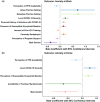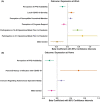Well-being and education of urology residents during the COVID-19 pandemic: Results of an American National Survey
- PMID: 32460433
- PMCID: PMC7283839
- DOI: 10.1111/ijcp.13559
Well-being and education of urology residents during the COVID-19 pandemic: Results of an American National Survey
Abstract
Background: The rapid spread of COVID-19 has placed tremendous strain on the American healthcare system. Few prior studies have evaluated the well-being of or changes to training for American resident physicians during the COVID-19 pandemic. We aim to study predictors of trainee well-being and changes to clinical practice using an anonymous survey of American urology residents.
Methods: An anonymous, voluntary, 47-question survey was sent to all ACGME-accredited urology programmes in the United States. We executed a cross-sectional analysis evaluating risk factors of perception of anxiety and depression both at work and home and educational outcomes. Multiple linear regressions models were used to estimate beta coefficients and 95% confidence intervals.
Results: Among ~1800 urology residents in the USA, 356 (20%) responded. Among these respondents, 24 had missing data leaving a sample size of 332. Important risk factors of mental health outcomes included perception of access to PPE, local COVID-19 severity and perception of susceptible household members. Risk factors for declination of redeployment included current redeployment, having children and concerns regarding ability to reach case minimums. Risk factors for concern of achieving operative autonomy included cancellation of elective cases and higher level of training.
Conclusions: Several potential actions, which could be taken by urology residency programme directors and hospital administration, may optimise urology resident well-being, morale, and education. These include advocating for adequate access to PPE, providing support at both the residency programme and institutional levels, instituting telehealth education programmes, and fostering a sense of shared responsibility of COVID-19 patients.
© 2020 John Wiley & Sons Ltd.
Conflict of interest statement
None of the authors have any direct conflicts of interest regarding this research project. However, of note, as a general financial disclosure, Dr Jeffrey P. Weiss is a consultant for Ferring Pharmasciences and an advisory board member for the Institute for Bladder and Prostate Research. None of the other authors have financial disclosures.
Figures




Comment in
-
Reimagining Headache Fellowships.Headache. 2020 Nov;60(10):2613-2617. doi: 10.1111/head.13965. Epub 2020 Sep 26. Headache. 2020. PMID: 32979226
References
-
- The U.S. Now Leads the World in Confirmed Coronavirus Cases. The New York Times, 2020. https://www.nytimes.com/2020/03/26/health/usa‐coronavirus‐cases.html. Accessed April 14, 2020
-
- COVID‐19 dashboard by the Center for Systems Science and Engineering (CSSE) at Johns Hopkins University (JHU). Johns Hopkins University, 2020. https://coronavirus.jhu.edu/map.html. Accessed April 14, 2020
-
- Hospitals push off surgeries to make room for coronavirus patients. The Wall Street Journal, 2020. https://www.wsj.com/articles/hospitals‐push‐off‐surgeries‐to‐make‐room‐f.... Accessed April 14, 2020
-
- Hospitals use telemedicine to minimize contact with virus patients. The Wall Street Journal, 2020. https://www.wsj.com/articles/hospitals‐use‐telemedicine‐to‐minimize‐cont.... Accessed April 14, 2020
MeSH terms
LinkOut - more resources
Full Text Sources
